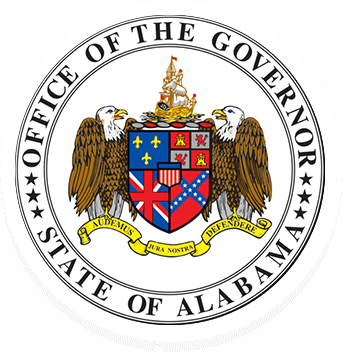Legislation
Governor Ivey’s administration is committed to being open, honest and transparent. The administration is dedicated to working with constituents and community leaders across all branches of government to make Alabama a better place to live, work and raise a family. Below are helpful links to keep the public informed-on Alabama’s legislative efforts.
View Governor Ivey’s 2020 Strategic Plan here.
View the post-election proclamation for the 2022 General Election here.
View the statewide 2022 constitutional amendment post-election proclamation here.
View the statewide 2022 post-election recompilation of the constitution proclamation here.
View the post-election proclamation for the 2020 Presidential and General Election here.
View the statewide 2020 constitutional amendment post-election proclamation here.
Individuals with general questions about the Alabama Legislature or the legislative process should visit the Alabama Legislature’s website.
In addition, you can find information about your district and contact information for your legislators by visiting the links below.
- Check your registration status and see your political districts
- Alabama House of Representatives
- Alabama Senate
To find the status of a bill, visit one of the links below.
To download a copy of a signed bill or resolution, visit the Alabama Secretary of State’s Government Records Inquiry System.
The Alabama Legislature also provides live audio and video services of legislative events.
Additional Resources:
Summary of the Governor’s Authority And Duties
(located in the Alabama Government Manual)
Creation and Authority
The office of Governor was established in 1819. See the Ala. Const. art. V, §§ 112-135. See also Ala. Code§§ 29-3-10 to 29-3-11; 36-13-1 to 36-13-10; 36-13-30 to 36-13-33; 36-6-6 to 36-6-7.
The office of Governor is filled by popular election. To qualify, one must be at least 30 years of age, must have been a United States citizen for at least ten years and a resident of Alabama for at least seven years immediately preceding election. He or she serves a four-year term of office and is eligible for no more than one additional successive term. The Governor may be removed by impeachment.
Purpose
The Governor is the chief executive of the State.
Duties
Executive. The Governor sees that laws are faithfully executed; acts as Commander-in-Chief of the militia; signs grants and commissions required by law; fills vacancies which occur in local elective offices when specified by law and in elected offices of the state executive and judicial branches when specified by law, and orders elections to fill such vacancies; removes officers appointed by the Governor except where otherwise provided by law or where the office is subject to provisions of the Merit System; fixes the salaries of certain state employees and officials at amounts not to exceed certain annual figures, as specified by law; extradites criminals; grants commutations to persons under sentence of death; approves all conveyances of land by any State agency and all contracts or leases made by any State agency; approves the terms and conditions of certain bond issues; and causes suits to be instituted to recover public money or property or to condemn land. In addition, the Governor causes defense to be instituted of certain civil actions against the State; issues executive orders; remits fines and forfeitures; offers rewards for the apprehension of felons; may authorize armed forces organizations to leave the State; has control of State property; among many other duties set out by the Alabama Constitution and statute.
Appointive Powers. The Governor appoints the heads of the following Cabinet agencies: Department of Mental Health, Department of Senior Services, Department of Commerce, Alabama Tourism Department, Alabama Emergency Management Agency, Alabama Law Enforcement Agency, Department of Conservation and Natural Resources, Department of Corrections, Department of Human Resources, Department of Economic and Community Affairs, Department of Finance, Department of Labor, Department of Insurance, Alabama Medicaid Agency, Department of Revenue, Department of Transportation, Military Department, ABC Board, Department of Early Childhood Education, Governor’s Office of Minority Affairs, and State Banking Department. The Governor also appoints replacements for many elected officials in the case of vacancy before the next election.
In addition, the Governor appoints at least one member on over 450 regulatory and licensing boards and commissions, university trustees, advisory boards and task forces that oversee a large variety of industries and make decisions that affect the day-to-day lives of Alabamians.
Ex officio President, Chairman or Member. The Governor serves as an ex officio member or as president or chairman of a variety of education, financial, human resources and regulatory boards.
Legislative. The Governor may convene the Legislature in extraordinary (special) sessions. He or she sends messages to the Legislature and may sign, or veto bills passed by the Legislature, veto items of appropriation bills at his or her discretion, and return bills to the Legislature with an “executive amendment.” In extreme situations, he or she may change the place of a legislative session to a location deemed safe and convenient.
Organization
The Governor’s Office Staff is divided into administrative, operations, legal, communications, legislative, appointments, and constituent services units. The Governor may appoint a legal advisor and other attorneys to advise the Governor in his or her official capacity or to institute, conduct, or appear in any court in any civil or criminal case in which the State is interested. Other personnel may include Chief of Staff, Deputy Chief of Staff, Legislative Affairs Director, Executive Secretary, Recording Secretary, Press Secretary, executive assistants, administrative assistants, and clerical personnel.
Financing
The Governor receives appropriations from the General Fund and sometimes other government funding sources for the purposes of the operations of the office.
Additional information about the governor’s legislative powers and duties can be found in Section 125 and Section 126 of the Constitution of Alabama.

